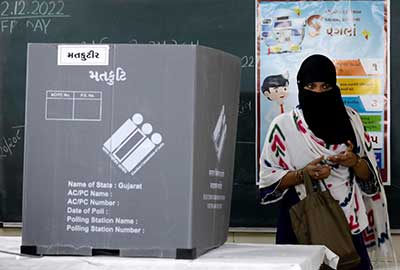Date: 14/12/2022
Relevance: GS-2: Government policies and interventions for development in various sectors
Key Phrases: Index of social hostilities, Democratic deficit, abandonment of civil conversation, Failure of justice, A flailing democracy, Gandhian tradition of politics, manufactured consent, politics of accommodation.
Why in News?
- The peaceful conduct of the recent elections reinforces Churchill’s idea of democracy as “the little man walking into the little booth, with a little pencil, making a little cross on a little bit of paper...” to elect a person of one’s choice.
- But the lesson of our evolving democracy is that a ballot by itself is not enough to yield a truly democratic state.
What do the reports suggest?
- The Washington-based think tank Pew Research Centre has recently come out with a study that puts India at the top of its index of social hostilities involving religion in 2020 in the context of the impact of Covid restrictions.
- According to the Economist Intelligence Unit (EIU), Indian democracy has been in decline since 2014, with an international ranking of 46 in the Democracy Index for 2021.
- Sweden’s university-based Varieties of Democracy Institute (V-DEM) ranks India even lower, at 101st in the world for electoral democracy and 97th for liberal democracy.
- On several indices, our democratic deficit impels an urgent introspection, even as we celebrate the resilience of our elective processes.
A flailing democracy:
- Rising inequality:
- A polity captive to the pull of sectarian mass mobilization and an economy in which the top 10% hold 77% of the nation’s wealth do not sit well with the foundational principles of egalitarian democracy.
- Decline of quality discussions:
- Ours is a flailing democracy is evident in an abandonment of civil conversation on the core challenges that beset us as a nation.
- Deteriorating Political Culture:
- A political discourse laced with vicious remarks against political rivals is a grim reminder that language and thought in a dialectical relationship corrupt each other.
- A political culture that sees “villainy as virtue” and “elevates unfettered abuse, imperious ignorance, untamed egotism and reflexive bigotry” across parties as the political conversation has disabled the nation from reaping the full dividends of a constitutional state.
- Politics that thrives on the persecution of adversaries in an abuse of the state’s coercive processes negates the essence of justice, just as the Opposition’s compulsive criticism for every action of the government regardless of its intrinsic merit, has weakened its credibility as a countervailing democratic force.
- Failure to deliver the constitutional promises:
- Anchored solely in expediency and unmindful of the moral imperatives, our politics stands condemned in its failure to deliver the constitutional promise of a liberal state committed to a just exercise of accountable power.
- It instead mirrors a society riven by cleavages and debilitating social discord amplified by sophistry and absolutism.
Failure of justice:
- Mortality of justice at the hands of law:
- Despite a proclaimed commitment to the rule of law, the country’s legal processes have failed justice in several ways, prompting the highest court to lament the “mortality of justice at the hands of law”.
- President Droupadi Murmu’s significant observation questioning the need for more jails and the apex court’s caution against routine custodial interrogation confirm a painful disregard for the promise of democracy.
- Concentration of power:
- The uninterrupted ramping up of executive power has unsettled institutional power equations designed to ensure the dispersal of power as the first principle of constitutional democracy.
- This has rendered the Indian state dysfunctional in its wider promise of freedom and justice under the law.
- Economic growth- democracy correlation:
- The decline of our democracy coinciding with the largest-ever expansion of the national economy and reduction in the levels of abject poverty question the absoluteness of the correlation between economic growth and a robust democracy.
- Declining resistance to protecting fundamental rights:
- Experience dictates a review of such assumptions and an examination of the extent to which our occupation with material pursuits has diminished our capacity to resist the state’s encroachment of fundamental rights.
Way forward:
- Need for the flame of freedom:
- Notwithstanding its backsliding, we can rescue our democracy as long as the flame of freedom is alive in our hearts and is nurtured by the valour of free people willing to walk the path of justice.
- Selfless leadership:
- Critical to the project of democratic renewal is a search for leadership whose quest to remain on the opening pages of history is driven by a cause larger than the self.
- Indeed, a true democracy cannot allow the flourishing of boastful individuals dwarfed by the narrowness of their politics.
- Reinvest in Gandhian tradition of politics:
- It is time that we reinvested ourselves in the Gandhian tradition of politics that emphasizes the importance of means in the furtherance of political goals.
- Our pursuit of democracy must address a flawed system that enables “manufactured consent”, manipulated majorities, and perversion of the ends of democratic politics.
- Rejuvenating the democratic institutions:
- The decline of democratic institutions can be arrested through a politics of national renewal based on reasoned conversations and a collective political assertion in favour of freedom over fear, inclusion over exclusion, and justice over injustice.
- Democratic institutions are, after all, only enforcers of national conscience, not its progenitors.
Conclusion:
- The efflorescence of “millions of free voices into one harmonious melody” as the basis of national consensus suggested by the Prime Minister, as against one by diktat, offers hope for bridging the deepened social and political divides.
- But this is possible only through a politics of accommodation and conciliation inspired by political magnanimity and honesty of purpose.
Source: The Hindu
Mains Question:
Q. “A truly democratic state cannot be produced by a vote alone; rather, it requires a politics of accommodation and conciliation inspired by political magnanimity and honesty of purpose.” Discuss.






















